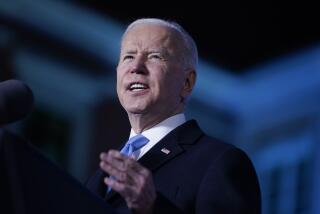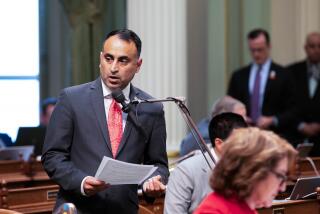Easing Burden of Health Payroll Tax Is Weighed
- Share via
WASHINGTON — Clinton Administration analysts believe that any payroll tax to finance a new health care system should be imposed on a sliding scale to ease the burden on small businesses and low-income workers, sources said Thursday.
The proposal, which analysts will recommend to the White House, also would exempt the first $10,000 of a company’s payroll and the first $5,000 of a worker’s salary, sources said. Administration analysts are still debating a limit on the amount of a worker’s total earnings that would be subject to the levy, with the extremes ranging from $57,000 to $150,000.
The only other major new revenue source under serious consideration at this time to help finance the plan is a federal cigarette tax hike of at least $1 a pack--a fourfold increase that is sure to start an intense battle in Congress, the sources said.
The amount and type of taxes required to pay for a new health care system loom as critical issues as planning enters its final stages. Administration officials estimate that the proposed system will cost between $30 billion and $90 billion, with much of the money going to provide coverage for an estimated 37 million Americans who have no health insurance.
As President Clinton prepares to focus on his health care reform agenda this long weekend at Camp David in Maryland, the Administration’s latest payroll deduction proposal calls for a levy averaging 7% for businesses and 1.5% or less for workers, sources said.
“That’s one idea,” a senior Administration official said. “There are a lot of ideas.”
Among the proposals is a formula calling for small businesses with fewer than 10 employees to pay no more than 5.8% of their payroll, while firms with fewer than five workers may have to pay no more than 5.2%, sources said.
The President, while not specifying that he has settled on a payroll premium, said during a Thursday morning Rose Garden town hall meeting that his analysts hope to “hit the national average, maybe even a little below the national average, of what employers are paying now” in premiums for workers’ health insurance.
The final figures will depend largely on a series of intricately linked decisions Clinton has yet to make, such as how quickly to phase in medical coverage for uninsured Americans and how extensive the government-designed standard benefits package will be.
Administration officials insist on calling the payroll levy a premium rather than a tax because, they argue, the funds would go not to government coffers but to large, regional consumer “alliances” set up to buy insurance for members.
Most networks would offer members at least three types of health plans. Most people probably would have to pay a portion of their medical costs, with the neediest receiving government subsidies, a top official of the White House Task Force on National Health Care Reform said Thursday.
The notion of financing health care reform with a payroll levy was floated earlier this month by First Lady Hillary Rodham Clinton, who chairs the presidential task force, during a private meeting on Capitol Hill. Administration officials have been mum on details.
As a rule of thumb, analysts say that each percentage point in payroll premiums can raise $25 billion or more annually.
The current federal tax on cigarettes is 24 cents per pack, and analysts say a $1-a-pack increase would raise an additional $11 billion a year initially, with the revenues diminishing over time as consumption levels drop.
With the well-heeled and well-connected tobacco lobby likely to strenuously resist raising the average cost of cigarettes from the current level of $1.75 a pack, sources said the White House is finalizing a strategy to sell the hike.
More to Read
Get the L.A. Times Politics newsletter
Deeply reported insights into legislation, politics and policy from Sacramento, Washington and beyond. In your inbox twice per week.
You may occasionally receive promotional content from the Los Angeles Times.










